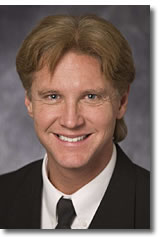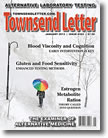|
 Darrell Hulisz, RPh, PharmD, is a pharmacist with a special interest in herbal medicines. He serves as an associate professor of family medicine and community health at Case Western Reserve University School of Medicine, in Ohio. "I first became interested in herbal medicines because our patients are interested in this subject," he says. "The patients I see in the family medicine department at University Hospitals often have questions about natural products, including herbs and dietary supplements." Darrell Hulisz, RPh, PharmD, is a pharmacist with a special interest in herbal medicines. He serves as an associate professor of family medicine and community health at Case Western Reserve University School of Medicine, in Ohio. "I first became interested in herbal medicines because our patients are interested in this subject," he says. "The patients I see in the family medicine department at University Hospitals often have questions about natural products, including herbs and dietary supplements."
While most of us are familiar with pharmacists who dispense medications at the local drugstore, Hulisz has a somewhat different role. He practices as a clinical pharmacist in the Family Medicine Residency Program at Case Medical Center. This means that he works together with medical and pharmacy students and family physicians in training, consulting on pharmaceutical issues for hospital inpatients and outpatients. His areas of special expertise include pain management, obesity, cardiovascular disease, geriatrics, and diabetes.
When questions about herbal medicines first emerged during clinical practice, Hulisz was initially frustrated because often he didn't have evidence-based answers. "I began researching the medical literature. Then I became aware of other resources, such as HerbalGram, published by the American Botanical Council. I became aware of the German Commission E Monographs. These are reliable resources, which look at objective scientific data and provide useful summaries for the lay public, as well as additional information for medical professionals."
Hulisz checks the peer-reviewed medical literature regularly to find information about herbs and supplements. "It's similar to reading the news ... you look at various sources but you don't necessarily believe everything you read," he says. "You dig and keep digging until you find solid data. Personally, I look for data from human clinical trials, especially randomized, double-blind, controlled trials where supplements are compared to either medicinal substances that we currently use or to a placebo." Hulisz recommends using supplements that list the exact amount of active ingredients, and counsels patients to use the same dosage and frequency as have been studied in clinical trials. "Patients should disclose the use of herbs and supplements to their physician," he says. "They should check with their physician and pharmacist if they are taking other medications or have chronic medical conditions."
Various Treatments Available for Insomnia
Insomnia is a very common problem, with many different potential causes. When patients have problems getting enough sleep, Hulisz mentions chamomile as one option to consider. "Of course, the first thing to discuss would be the basic principles of sleep hygiene," he notes. Sleep hygiene means creating an environment and developing habits that support healthy sleep. Many people find that gradually establishing good sleep hygiene is sufficient to make sleep issues dissolve. His tips include:
- Establish a routine time for bedtime and awakening.
- Avoid daytime naps.
- Avoid alcohol, caffeine, and other central nervous system stimulants.
- Administer medications that might lead to insomnia in the morning (so the effect wears off by bedtime.)
- Exercise regularly, but not just prior to bedtime.
- Limit fluid intake close to bedtime.
- Avoid eating large meals immediately before bedtime.
- Reduce ambient lighting at least one hour before bedtime.
- Mask noises or use soft earplugs if necessary.
- Use the bedroom only for sleeping, reading, or sex.
- Avoid engaging in stressful activities or unpleasant tasks near bedtime.
Once people have established good sleep habits, if they still need additional help falling or staying asleep, Hulisz suggests that chamomile or melatonin might be useful. "Before people start buying over-the-counter supplements like Tylenol PM, for example, they might want to consider chamomile tea," he says. "We try to interview our patients and find out what they are taking, and I've found that more often than not patients tell us that chamomile helps them. After several years of people telling me that chamomile relaxes them and helps them get to sleep better, that seems like valuable information – I don't dismiss that information." However, Hulisz adds that patients with allergies to ragweed and flowers in the daisy family, such as asters and chrysanthemums, might have allergic reactions to products containing chamomile.
Tylenol PM is available over the counter, without a prescription. It contains diphenhydramine (Benadryl), which has a sedating effect on many people the first night or two that it is used. However, if used for several nights, this sedating effect tends to wear off. "The first time you take a medication that acts on the central nervous system, you really need to be in a safe place, at home, perhaps ready for bed," Hulisz says. "You don't want to be driving or operating machinery or anything like that. Use your own body as a guide to see how you react to each specific medication, because unfortunately some medications can have untoward side effects."
Melatonin is particularly useful for the elderly and for people who are dealing with circadian rhythm disturbances in their sleep patterns. This includes people who fly often, crossing time zones, or who work evening or night shifts and try to get their sleep during the day. "Melatonin seems to be particularly effective in the elderly because as we grow older our native melatonin levels decline," Hulisz observes. "This may be part of the reason many elderly people have trouble sleeping."
Melatonin should be taken one to two hours before bedtime. When Hulisz recommends melatonin products, he usually relies on the sustained release or extended release versions, because the better clinical trials that show evidence for its efficacy have been done with those preparations.
"The effects of melatonin are more subtle than Benadryl," Hulisz says. "You don't get that real sedated sleepy feeling from melatonin. One related advantage is that you don't experience daytime drowsiness and hangover the next day. Many people who use Benadryl in all its different versions find that they may have trouble waking up, or it may really affect alertness the following day, what we call the ‘next day hangover effect.' You don't really get that with melatonin, and you don't develop tolerance. Melatonin seems to work better when it is taken over an extended period of time. However, at present we don't have data on long-term usage of melatonin ... we have data on nine months of continuous use, at most."
Resources
Google "Darrell Hulisz – Assisting the Insomniac" for a slide show with many more details about different forms of insomnia and various treatment methods.
American Academy of Sleep Medicine: http://www.aasmnet.org.
National Sleep Foundation: http://www.sleepfoundation.org.
National Center for Sleep Disorders Research: http://www.nhlbi.nih.gov/health/dci/Browse/Sleep.html.
Elaine Zablocki has been a freelance health-care journalist for more than 20 years. She was the editor of Alternative Medicine Business News and CHRF News Files. She writes regularly for many health-care publications.
|



![]()
![]()
![]()

 Darrell Hulisz, RPh, PharmD, is a pharmacist with a special interest in herbal medicines. He serves as an associate professor of family medicine and community health at Case Western Reserve University School of Medicine, in Ohio. "I first became interested in herbal medicines because our patients are interested in this subject," he says. "The patients I see in the family medicine department at University Hospitals often have questions about natural products, including herbs and dietary supplements."
Darrell Hulisz, RPh, PharmD, is a pharmacist with a special interest in herbal medicines. He serves as an associate professor of family medicine and community health at Case Western Reserve University School of Medicine, in Ohio. "I first became interested in herbal medicines because our patients are interested in this subject," he says. "The patients I see in the family medicine department at University Hospitals often have questions about natural products, including herbs and dietary supplements." 